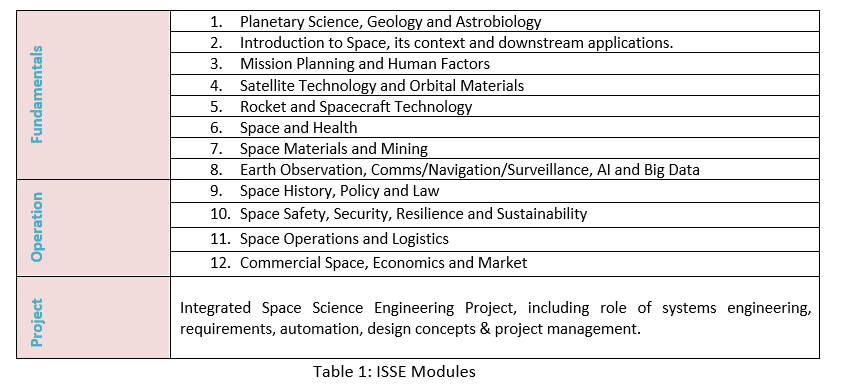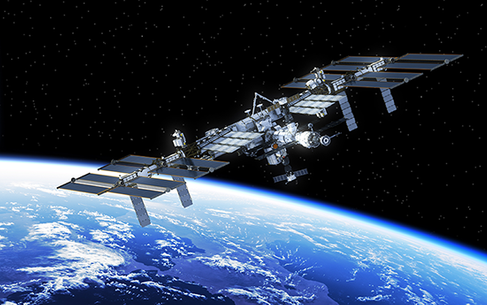Imperial College London’s new educational offer in Integrated Space Science and Engineering (ISSE), presents a unique opportunity to address space and its related issues. ISSE espouses a multi-stakeholder provision concept. It is provided under the auspices of the Imperial Space Lab in collaboration with Hemraj Consulting and the Institute for Space Policy and Law (ISPL) and is hosted by the Department of Civil and Environmental Engineering at Imperial.
The Program is designed around the three interconnected pillars of ‘fundamentals’, ‘operation’ and how these relate to a potential ‘design project’. The fundamentals benefit from modules (Table 1) addressing the relevant science and technology underpinning exploration and how space can facilitate innovation to improve life on Earth. Operational considerations include policy, commerce, logistics and the critical areas of safety, security, resilience and sustainability. The knowledge gained from the Fundamentals and Operation pillars form an essential input to the Design project on aspects of space (such as the design of a settlement in space for an identified mission). The Design Project gives students a chance to apply what they have learnt in a more hands-on real-life context.

Team based learning via group project:
As part of this programme, students will have the opportunity to work in large teams with a smaller sub-division on a group projects. Students will present their project on the last day of the programme.
On completion of this programme, students will be able to:
- Apply advanced knowledge and skills: Participants will be equipped with knowledge and skills relevant to the space industry, gaining insights into their real-world applications and benefits, and enabling them to make valuable contributions in their professional roles.
- Drive innovation and problem-solving: Participants will develop a mindset for innovation and effective problem-solving, allowing them to tackle complex challenges within the space and related domains and propose creative solutions.
- Foster collaboration and teamwork: Participants will experience the importance of collaboration and teamwork, equipping them with the skills to work effectively in multidisciplinary settings and leverage diverse perspectives.
- Communicate effectively: Participants will strengthen their communication skills (written and verbal), enabling them to articulate complex ideas, engage stakeholders, and effectively convey space-related concepts to various audiences.
- Cultivate leadership capabilities: Participants will enhance their leadership abilities and develop the confidence to take on leadership roles within the space and related sectors, driving impactful initiatives and inspiring others.
- Engage in ethical and responsible practice: Participants will develop the skills required for ethical decision making and responsible practices in space exploration, emphasising the importance of sustainability, safety, resilience, regulatory, legal and ethical considerations.
- Develop entrepreneurial mindset, culture and skills: Participants will experience and develop entrepreneurial mindset among participants, equipping them with the knowledge and skills needed to identify business opportunities, develop innovative space-related ventures, and navigate the entrepreneurial landscape.
- Design and project management proficiency: Participants will gain proficiency in design thinking methodologies and project management techniques specifically tailored for the space and related industry. This will enable them to effectively plan, execute and deliver successful space and related projects.
For enquiries and registration, please contact:
Quantum Education Ltd on:
- WeChat ID: IC_QuantumED
-
WeChat ID: IC_QuantumED_SIN
- GraceOliver Cao:
- (86)21-64199095
- (86)13901632417
- Zi Ye
- (65) 81072968
- WhatsApp:+6581072968
- Registration: https://www.education-imperial.com
More information
- Programme structures & teaching methods
- Teaching faculty and programme director
- Who should attend
- Entry requirements
- Certification
Online component:
40 online learning hours spread over several months covering the following:
- 12 x 2-hour live lectures delivering via Microsoft Teams with group discussions and questions.
- Web based exercises and quizzes will be provided for formative feedback.
- Group projects for assessing the learning outcomes, supported by 12 x 1 hour tutorials and feedback.
- 2 x 2-hour session on mini project presentation for pillars 1 & 2.
The programme will be delivered over Microsoft Teams. Live classes will be delivered on weekdays between 10:00 to 13:00 UK time.
Project work will be done through team-based learning and tutorials. Online project channels will be allocated to each team for project work. Students will be able to use the channel at any time to work on their project.
In-person component:
1 x 30 hours in-person Design Project Module to take place at Imperial College London campus from 19-23 August 2024.
Final design projects will be presented in-person in large groups on the final day of the programme. A prize will be awarded to the team with the best project.
The entire programme will be taught in English.
The programme will be delivered by a multi-disciplinary faculty team at Imperial College, Imperial Space Lab, and London Institute of Space Policy and Law.

The programme is directed by Sunday Popo-Ola who is currently an Associate Professor at Imperial College London, and his work reflects the level of multidisciplinary expertise that he has obtained. His work cuts across three sub-sections within the department namely Engineering Structures, Environmental, Transportation and Systems and Mechanics. Sunday teaches Engineering Construction, Communication and Creative Design to University students.
 Professor Washington Yotto Ochieng, EBS, FREng, is Head of the Department of Civil and Environmental Engineering, Chair Professor in Positioning and Navigation Systems, Director of the Institute for Security Science and Technology (ISST) and Member of the Steering Committee of the Space Laboratory at Imperial College London. He is a Trustee of the Science Museum Group (SMG) and Royal Institute of Navigation (RIN), Chair of the Advisory Board of the Science Museum and Vice President of the RIN. He is a Scientific Advisor at the Department for Transport (DfT); Foreign, Commonwealth and Development Office (FCDO) and National Physical Laboratory (NPL).
Professor Washington Yotto Ochieng, EBS, FREng, is Head of the Department of Civil and Environmental Engineering, Chair Professor in Positioning and Navigation Systems, Director of the Institute for Security Science and Technology (ISST) and Member of the Steering Committee of the Space Laboratory at Imperial College London. He is a Trustee of the Science Museum Group (SMG) and Royal Institute of Navigation (RIN), Chair of the Advisory Board of the Science Museum and Vice President of the RIN. He is a Scientific Advisor at the Department for Transport (DfT); Foreign, Commonwealth and Development Office (FCDO) and National Physical Laboratory (NPL).
 Alison Ahearn is an Educational Developer for the Space Science Engineering Foundation (SSE2F) and is a Principal Teaching Fellow at Imperial College London. She specialises in complex, challenge-based learning, for which she won awards at Imperial and in industry (particularly for inventing the Constructionarium field course with industry partners in 2003). Originally a practicing lawyer, she also holds an MSc in Science Communication from Imperial.
Alison Ahearn is an Educational Developer for the Space Science Engineering Foundation (SSE2F) and is a Principal Teaching Fellow at Imperial College London. She specialises in complex, challenge-based learning, for which she won awards at Imperial and in industry (particularly for inventing the Constructionarium field course with industry partners in 2003). Originally a practicing lawyer, she also holds an MSc in Science Communication from Imperial.
 Greg Autry is a noted space management researcher, writer, and professor at Arizona State University’s Thunderbird School of Global Management as well as with Imperial College’s Institute for Security Science and Technology. Previously at the University of California and University of Southern California, Dr Autry served on the NASA Agency Review Team, as NASA’s White House Liaison and as chair of the safety working group for the FAA’s Commercial Space Transportation Advisory Committee. He has provided AI and space tech consultation for Oxford University, while also teaching space entrepreneurship at the International Space University program of Florida Institute of Technology.
Greg Autry is a noted space management researcher, writer, and professor at Arizona State University’s Thunderbird School of Global Management as well as with Imperial College’s Institute for Security Science and Technology. Previously at the University of California and University of Southern California, Dr Autry served on the NASA Agency Review Team, as NASA’s White House Liaison and as chair of the safety working group for the FAA’s Commercial Space Transportation Advisory Committee. He has provided AI and space tech consultation for Oxford University, while also teaching space entrepreneurship at the International Space University program of Florida Institute of Technology.
 Michel-Alexandre Cardin is Associate Professor in Computational Aided Engineering at the Dyson School of Design Engineering, Imperial College London, and Director of the Strategic Engineering Laboratory. He works on systems design and optimization under uncertainty, focusing on the development and evaluation of new computational techniques, digital processes, and algorithms to support the design of complex engineered systems, with applications in energy, transportation, and space systems. He holds advanced degrees from prestigious institutions including MIT and the University of Toronto and has a background in aerospace engineering and space science.
Michel-Alexandre Cardin is Associate Professor in Computational Aided Engineering at the Dyson School of Design Engineering, Imperial College London, and Director of the Strategic Engineering Laboratory. He works on systems design and optimization under uncertainty, focusing on the development and evaluation of new computational techniques, digital processes, and algorithms to support the design of complex engineered systems, with applications in energy, transportation, and space systems. He holds advanced degrees from prestigious institutions including MIT and the University of Toronto and has a background in aerospace engineering and space science.
 Jan Cilliers FREng is Chair in Mineral Processing and has a background in terrestrial mining. He now leads a research team developing methods and equipment for mineral recovery, sizing and separation in space. They also consider space mining process design, scale and economics.
Jan Cilliers FREng is Chair in Mineral Processing and has a background in terrestrial mining. He now leads a research team developing methods and equipment for mineral recovery, sizing and separation in space. They also consider space mining process design, scale and economics.
 Professor Jonathan Eastwood, Director, Imperial Sapce Lab, is a Professor of Space Physics at Imperial College London, working in the Space and Atmospheric Physics group, part of the Department of Physics. His research interests include space weather, space plasma physics, and developing novel miniaturised instrumentation for space weather monitoring. He is an active participant in multiple NASA and ESA space science missions, and serves as Principal Investigator for the magnetometer experiments on the RadCube CubeSat and the planned Lagrange space weather mission. Since September 2019 he has served as Director of the Space Lab Network of Excellence, the multi-disciplinary Network of Excellence for all space-related activities at Imperial College London. It has >130 members drawn from across Imperial. The purpose of Space Lab is to bring together all of Imperial’s activities in space in a coordinated way for the benefit of its members, Imperial, and society at large. Its focus is on societal and community outreach, industry and enterprise, academic partnerships, and contributions to evidence-based policy.
Professor Jonathan Eastwood, Director, Imperial Sapce Lab, is a Professor of Space Physics at Imperial College London, working in the Space and Atmospheric Physics group, part of the Department of Physics. His research interests include space weather, space plasma physics, and developing novel miniaturised instrumentation for space weather monitoring. He is an active participant in multiple NASA and ESA space science missions, and serves as Principal Investigator for the magnetometer experiments on the RadCube CubeSat and the planned Lagrange space weather mission. Since September 2019 he has served as Director of the Space Lab Network of Excellence, the multi-disciplinary Network of Excellence for all space-related activities at Imperial College London. It has >130 members drawn from across Imperial. The purpose of Space Lab is to bring together all of Imperial’s activities in space in a coordinated way for the benefit of its members, Imperial, and society at large. Its focus is on societal and community outreach, industry and enterprise, academic partnerships, and contributions to evidence-based policy.
 Aaron Knoll is Senior Lecturer in plasma propulsion for spacecraft at Imperial College London. His research develops novel low power plasma propulsion technologies for small spacecraft. He heads the Imperial Plasma Propulsion Laboratory (IPPL) at Imperial College London and has expertise in researching alternative propellants, MEMS-based electrolysis micro-propulsion, and hybrid electric + chemical propulsion for spacecraft.
Aaron Knoll is Senior Lecturer in plasma propulsion for spacecraft at Imperial College London. His research develops novel low power plasma propulsion technologies for small spacecraft. He heads the Imperial Plasma Propulsion Laboratory (IPPL) at Imperial College London and has expertise in researching alternative propellants, MEMS-based electrolysis micro-propulsion, and hybrid electric + chemical propulsion for spacecraft.
 Philippa Mason is Senior Lecturer in Planetary Remote Sensing in the Department of Earth Science & Engineering, at Imperial College London and co-leader of the College’s Earth Observation Network. She is an Earth and planetary geologist specialising in satellite imagery analysis of rocks, minerals, geological structures, and tectonics on Earth and other planets.
Philippa Mason is Senior Lecturer in Planetary Remote Sensing in the Department of Earth Science & Engineering, at Imperial College London and co-leader of the College’s Earth Observation Network. She is an Earth and planetary geologist specialising in satellite imagery analysis of rocks, minerals, geological structures, and tectonics on Earth and other planets.
Sa'id Mosteshar is the Director and Professor of International Space Law at the London Institute of Space Policy and Law. With over twenty-five years of experience as a Barrister and California Attorney, he has provided legal and policy advice to governments, international agencies, and major space corporations. Sa'id holds a bachelor's degree in physics and is actively engaged in space leadership councils and international committees, including the UK delegation to the UN Committee on Peaceful Uses of Outer Space. He teaches space law and policy, and his expertise extends to arbitration cases involving orbital and frequency assignments as well as satellite-based data compression algorithms.
 Matthew Santer is a Professor of Aerospace Structures at Imperial College London, and an expert in the design of advanced spacecraft structures and technologies. He is a Fellow of the Royal Aeronautical Society, an Associate Fellow of the American Institute of Aeronautics and Astronautics (AIAA) and served as chair of the AIAA Spacecraft Structures Technical Committee.
Matthew Santer is a Professor of Aerospace Structures at Imperial College London, and an expert in the design of advanced spacecraft structures and technologies. He is a Fellow of the Royal Aeronautical Society, an Associate Fellow of the American Institute of Aeronautics and Astronautics (AIAA) and served as chair of the AIAA Spacecraft Structures Technical Committee.

Mark Sephton is a Professor of Organic Geochemistry in the Department of Earth Science and Engineering at Imperial College London. His research is multidisciplinary and includes astrobiology and space missions. He has published over 250 scientific articles. In recognition of his pioneering work on analytically challenging extra-terrestrial samples, Sephton now orbits between Mars and Jupiter. He is currently a science team member for the NASA Mars 2020 Perseverance Rover mission that will collect samples of Mars for return to Earth, and the Europa Clipper mission that will use mass spectrometry to search for evidence of life in the subsurface ocean of Jupiter’s icy moon.
 Stanley O. Starr a retired NASA physicist and engineer based in the UK who currently supports lunar mining research and education at Imperial College London. During his time at NASA, he held various leadership positions, including Branch Chief for Applied Sciences, where he managed a team of researchers focused on developing new technologies for space launch and exploration. With 37 years of experience at Kennedy Space Center, his contributions spanned multiple areas, including propellant detection, life support systems, cryogenic storage, sensors, and space exploration planning. He holds an MA in Physics from the University of South Florida.
Stanley O. Starr a retired NASA physicist and engineer based in the UK who currently supports lunar mining research and education at Imperial College London. During his time at NASA, he held various leadership positions, including Branch Chief for Applied Sciences, where he managed a team of researchers focused on developing new technologies for space launch and exploration. With 37 years of experience at Kennedy Space Center, his contributions spanned multiple areas, including propellant detection, life support systems, cryogenic storage, sensors, and space exploration planning. He holds an MA in Physics from the University of South Florida.
This programme is designed for undergraduate or postgraduate students with an interest in the space industry, who are expected to be studying in a STEM subject such as Engineering, Computing, Software Engineering, Maths, Physics, Medicine, BioScience or related disciplines.
Students will need to have access to a computer with a webcam, microphone and good internet connection to attend the live classes.
English requirements:
All students are required to have a good command of English, and if it is not their first language, they will need to satisfy the College requirement as follows:
- a minimum score of IELTS (Academic Test) 6.5 overall (with no less than 6.0 in any element) or equivalent.
- TOEFL (iBT) 92 overall (minimum 20 in all elements)
- CET- 4 (China) minimum score of 550
- CET- 6 (China) minimum score of 520
Students will receive an Imperial College London digital certificate on successful completion of this programme and a prize will be awarded to the best project team. Each student will also receive a transcript for their project marks.
